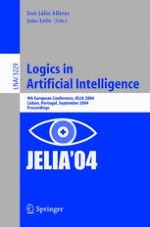2004 | OriginalPaper | Buchkapitel
Characterizations for Relativized Notions of Equivalence in Answer Set Programming
verfasst von : Stefan Woltran
Erschienen in: Logics in Artificial Intelligence
Verlag: Springer Berlin Heidelberg
Enthalten in: Professional Book Archive
Aktivieren Sie unsere intelligente Suche, um passende Fachinhalte oder Patente zu finden.
Wählen Sie Textabschnitte aus um mit Künstlicher Intelligenz passenden Patente zu finden. powered by
Markieren Sie Textabschnitte, um KI-gestützt weitere passende Inhalte zu finden. powered by
Recent research in nonmonotonic logic programming focuses on alternative notions of equivalence. In particular, strong and uniform equivalence are both proposed as useful tools to optimize (parts of) a logic program. More specifically, given a set P of program rules and a possible optimization Q, strong (resp. uniform) equivalence requires that adding any set S of rules (resp. facts) to P and Q simultaneously results in equivalent programs, i.e., P∪ S and Q∪ S possess the same stable models. However, in practice it is often necessary to relax this condition in such a way, that dedicated internal atoms in P or Q are no longer allowed to occur in the possible extensions S. In this paper, we consider these relativized notions of both uniform and strong equivalence and provide semantical characterizations by generalizing the notions of UE- and SE-modelhood. These new characterizations capture all notions of equivalence including ordinary equivalence in a uniform way. Finally, we analyze the complexity of the introduced equivalence tests for the important classes of normal and disjunctive logic programs. As a by-product, we reduce the tests for relativized equivalences to ordinary equivalence between two programs. These reductions may serve as a basis for implementation.
